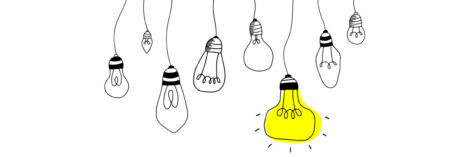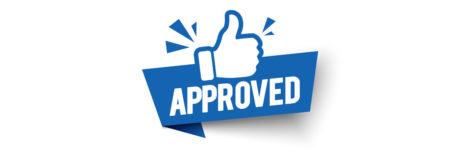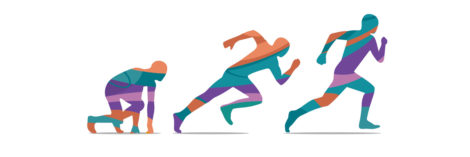Typewise is a tech start-up launched by David Eberle and his partner Janis Berneker with the idea of helping smartphone users by simplifying typing. This entrepreneurial adventure is proving to be particularly rich in twists and turns.
Discover this entrepreneurial adventure in this new podcast.
Summary
- The genesis of the business idea
- Validation of the business idea
- Getting started
- Take-off
- The future
- IntoTheMinds podcasts
The idea to be retained absolutely
As an entrepreneur, you have to be persistent and know how to bounce back. Typewise was not founded in a day and is still growing. Patience is, therefore, one of the virtues that young entrepreneur’s must-have.
The genesis of the business idea
The genesis of the Typewise idea comes from several observations:
- We still use keyboards that were designed in the 19th century for use with our 10 fingers. However, the smartphone only involves the use of the 2 thumbs.
- 1/5 words typed on a smartphone contain a mistake (spelling or typing error)
- These mistakes have an impact on our image, and correcting them takes time.
- Many users prefer to write a text, e-mail or even a message on a computer rather than via their smartphone.
- For the most part, it is still more interesting to type on a computer than on a smartphone in terms of rapidity.
Our co-founder Janice approached me one day with the idea of designing a keyboard
Typewise is not the first company to embark on the development of a more appropriate keyboard for smartphones.
2 issues related to current keyboards for use on a smartphone
- The organisation of keys
- The space between them
The keyboard of a smartphone is smaller; the advantage of rearranging the keys is the distance to be covered with the fingers is reduced.
However, the co-founders soon realised that reorganising the keys would not be enough and that it could have a substantial impact on the number of prospects.
Auto-Correction
Auto-correction is a significant advantage for users. However, David Eberle explains that difficulties are encountered, mainly when users write words that the spell checker does not know.
A good example is for German-speaking Swiss, whose language, which differs from traditional German, is not present in any dictionary. This makes automatic correction complicated and irrelevant.
Validation of the business idea
The co-founders of the start-up launched the first phase of market research to confirm their business idea. By collecting user feedback, notably via questionnaires and interviews, they were able to detect any problems encountered on smartphone keyboards.
The second phase was to launch a proof-of-concept on Android to define the technical objectives for the creation of a numeric keyboard.
[The aim was to] address these problems with our solution.
Getting started
Once the phase of confirming the business idea was completed, the co-founders of Typewise launched a crowdfunding campaign on Kickstarter for several reasons:
- To generate funds to reinvest in the product
- Checking market and consumer interest in such a product
- Press coverage
David Eberle announces that 800 people supported them in this campaign, which finally brought in 15,000 euros.
The application and its use
- The application costs $2.00 to purchase and allows users to access the basic keyboard.
- A premium option is available for 25 euros (one-time purchase) and gives access to additional options.
This model seems to work particularly well in the United States, where users and consumers are used to this type of business model. David Eberle notes resistance from the European market, which is less accustomed to this model.
[The app enjoyed a] nice traction in the first week [with] 10s of thousands of downloads.
However, the road has not been smooth, as David Eberle explains, the start-up experienced difficulties in raising funds. Moreover, the competition seems fierce with Google and Apple, who have significantly improved their keyboards and automatic correctors.
Take off
The start-up was able to take off little by little, thanks in part to Typewise’s involvement in a Swiss government start-up programme. This experience allowed them to be supported by experts. However, David Eberle explains that after a year, they need to bring funds and liquidity into the company. Following this experience, they pitch their idea to investors who commit themselves to them.
Psychologically this was huge because it was the first time that a third party actually believed in us and not just by saying it, but even giving us something for it.
The impact of recruitment in the take-off process
Typewise’s take-off phase was fuelled in particular by the recruitment of a professional developer in early 2019.
The two co-founders had to invest out of their own pockets to continue the adventure and bring their idea to fruition. At the end of 2019, they start working full-time on the project.
For David Eberle, HR is an essential subject for the growth of a company. He expresses the importance of being versatile as a start-up, but also of knowing how to hire competent people to help the project move forward.
To do this, Switzerland is a mine of talent straight out of the polytechnic schools, for example. For Typewise, however, this investment was not conceivable, and the start-up turned to European recruitment, with, for example, the application development team in Belgrade (Serbia).
At this stage, it’s really about having the right team and, I think, great people can build great things
The future
Typewise’s goal is to become profitable in the coming years so that it can continue to invest and have an impact on the quality of user experiences.
[We want to] pour more money into the development, the scale-up and to start working with businesses, with licensing partners, with partners: with OEMs directly, smartphone manufacturers…
Future objectives
- 1 million users
- A profitable business
- Increase in the premium user rate
A podcast to help you develop your start-up
In 2020 we are changing the format of our podcasts. The aim is to help you develop your start-up by providing you with relevant information on specific topics.
Our podcasts are now divided into chapters of +/- 3 minutes. Each chapter is dedicated to a specific theme or development phase. You can therefore listen to the entire podcast or choose to listen to only part of it by directly selecting the part that interests you the most.
Illustrations: shutterstock
Posted in Entrepreneurship.





